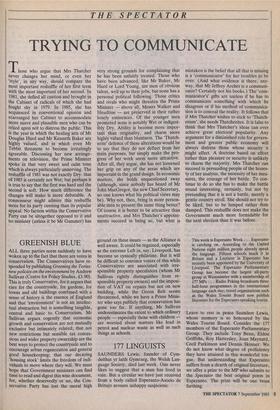THE SPECTATOR
TRYING TO COMMUNICATE
Those who argue that Mrs Thatcher never changes her mind, or even her `style', in any way, should compare the most important reshuffle of her first term with the most important of her second. In 1981, she defied all caution and brought in the Cabinet of radicals of which she had fought shy in 1979. In 1985, she has acquiesced in conventional opinion and rearranged her Cabinet to accommodate more suave and plausible men who can be relied upon not to distress the public. This Is the year in which the healing arts of Mr Douglas Hurd and Mr Kenneth Baker are highly valued, and in which even Mr Tebbit threatens to become irritatingly agreeable. Discussing her new arrange- ments on television, the Prime Minister spoke in that very sweet and calm tone which is always particularly unnerving. The reshuffle of 1981 was not exactly Dry: that of 1985 is certainly not Wet; but perhaps it is true to say that the first was hard and the second is soft. How much difference the changes will make is more debatable. A connoisseur might admire this reshuffle more for its party cunning than its popular appeal. No faction within the Conservative Party can be altogether opposed to it and no minister (unless it be Mr Gummer) has very strong grounds for complaining that he has been unfairly treated. Those who have been advanced, like Mr Baker, Mr Hurd or Lord Young, are men of obvious talent, well up to their jobs, but none has a personal political following. Those critics and rivals who might threaten the Prime Minister — above all, Messrs Walker and Heseltine — are prekrved in their rather lonely eminences. Of the younger men promoted none is notably Wet or indigest- ibly Dry. Ability is become more impor- tant than originality, and charm more highly valued than bluntness. The 'Thatch- erite' defence of these alterations would be to say that they do not deflect from her main purposes, but simply make the pro- gress of her work seem more attractive. After all, they argue, she has not loosened her grip on any of the areas which are important in the grand design. In economic matters, she holds unquestioned sway (although, since nobody has heard of Mr John MacGregor, the new Chief Secretary, no one knows what his political views may be). Why not, then, bring in more person- able men to present the same thing better? Of course it is better to be attractive than unattractive, and Mrs Thatcher's appoint- ments succeed in being so, but what is mistaken is the belief that all that is missing is a 'communicator' for her troubles to be over. (And what evidence is there, any- way, that Mr Jeffrey Archer is a communi- cator? Certainly not his books.) The 'com- municator's' gifts are useless if he has to communicate something with which he disagrees or if his method of communica- tion is to conceal the reality. It follows that if Mrs Thatcher wishes to stick to 'Thatch- erism', she needs Thatcherites. It is false to think that Mrs Thatcher's ideas can ever achieve great electoral popularity. Any argument for a diminished role for govern- ment and greater public economy will always distress those whose security it ,might affect. A doctrine based on effort rather than pleasure or security is unlikely to charm the majority. Mrs Thatcher can succeed in persuading people of the hones- ty of her analysis, the necessity of her mea- sures, the courage of her battle. To con- tinue to do so she has to make the battle sound interesting, certainly, but not by pretending that it is not a battle, merely a gentle country stroll. She should not try to be liked, but to be lumped rather than dumped. This reshuffle does not make the Government much more formidable for the next election than it was before.










































 Previous page
Previous page